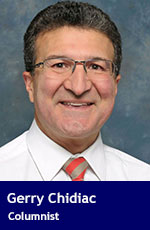 During my rebellious teen years, I listened to an incredible band from Detroit (the Motor City) called MC5. On one of their live albums, recorded in the late 1960s, they made a statement that struck me and has never left me: “Brothers and sisters, the time has come for each and every one of you to decide whether you are going to be the problem or whether you are going to be the solution.”
During my rebellious teen years, I listened to an incredible band from Detroit (the Motor City) called MC5. On one of their live albums, recorded in the late 1960s, they made a statement that struck me and has never left me: “Brothers and sisters, the time has come for each and every one of you to decide whether you are going to be the problem or whether you are going to be the solution.”
It’s obvious that the world has problems. Injustice, hunger, crime, poverty, racism and abuse have been with us for many years and won’t leave in the foreseeable future. If I don’t want to be the problem, how do I become the solution?
Some say we need violent revolution. History shows, however, that these regime changes rarely bring about long-lasting and significant transformations. Countries remain poor and human rights abuses continue.
The ground-breaking 20th century anthropologist Margaret Mead stated, “Never doubt that a small group of thoughtful, committed citizens can change the world; indeed, it’s the only thing that ever has.”
How does one become a “thoughtful and committed citizen,” however? How do the rest of us know who to follow? How do we even know what kind of world we want to create?
Could ‘being the solution’ simply mean embracing the essence of what it means to be a good person? If that’s the case, what ideals must one strive for in order to live this kind of a meaningful life?
First Nations traditions reflect global wisdom in calling upon us to live the Seven Sacred Teachings. As stated by Empowering the Spirit, these principles include:
Wisdom: To cherish knowledge is to know wisdom.
Love: To know love is to know peace.
Respect: To honour all of the creation is to have respect.
Bravery: Bravery is to face the foe with integrity.
Honesty: Honesty also means righteousness, to be honest with yourself in word and action.
Humility: Humility is to know yourself as a sacred part of creation.
Truth: Truth is to know all of these things.
Stephen Covey, in his book The 7 Habits of Highly Effective People, guides his readers through an exercise that some may find morbid and most find quite challenging. He tells us to imagine that we’re at our own funerals and to write down what we think family members, coworkers and friends would say about us in their eulogies.
Would my family members say that I lived with love and respect? Would my coworkers say that I lived with wisdom, honesty and bravery? Would my dearest friends call me a person of humility and truth?
These aren’t easy questions to answer but they can help us to refocus our lives. Covey culminates this activity in calling upon each individual to come up with a personal mission statement that will serve as a compass on the journey of life.
It’s very easy to get distracted by easy money, manipulative power and shallow relationships. But at the core of our being we know what’s right. This is why the Seven Sacred Teachings resonate so deeply for all of us, no matter where we’re from or what religion or philosophy we follow. These are the principles that lead to a joyful and satisfying life.
How do I choose whether I’m going to be the problem or the solution?
Perhaps the best answer came from Mahatma Gandhi, the man who was arguably the greatest revolutionary of the last century: “Be the change you wish to see in the world.”
Troy Media columnist Gerry Chidiac is an award-winning high school teacher specializing in languages, genocide studies and work with at-risk students.
The views, opinions and positions expressed by columnists and contributors are the author’s alone. They do not inherently or expressly reflect the views, opinions and/or positions of our publication.

